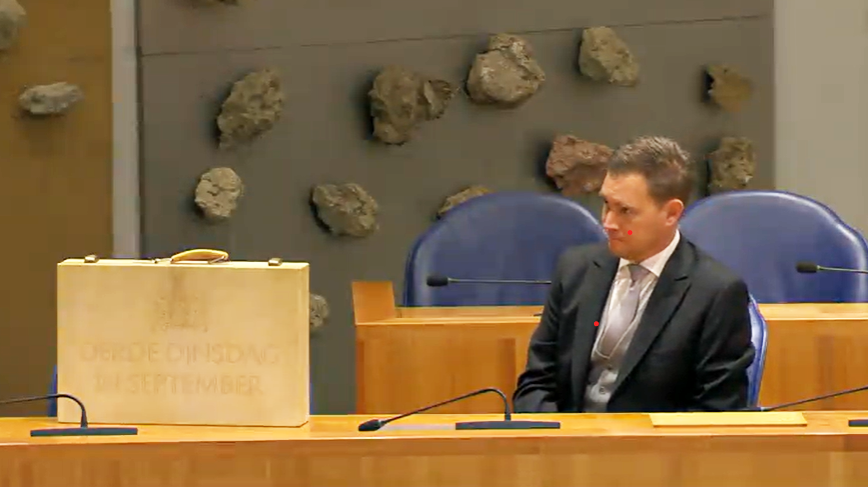Students and universities deeply concerned
Budget Day: feasible or not, cutbacks will happen

According to the official 2025 budget for the Ministry of Higher Education, Culture and Science, research universities will face significant budget cuts as of next year. Universities of applied sciences will not be hit as hard. Most of the measures to realise these cuts had already been announced, but now the exact figures and deadlines have been unveiled.
Fine for 'slow' students
The government foresees that the fine for students who take more than one additional year to graduate will generate 95 million euros in 2026 and over 280 million euros in subsequent years. But that's according to the budget memo. Civil servants warned last spring that it would not be feasible to achieve that so quickly.
International students
The same goes for reducing the number of international students. The cabinet expects to save 29 million euros this way in 2026, and 272 million euros three years later. However, universities and universities of applied sciences must cooperate with these plans for the savings to materialise and, according to civil servants, there is "no direct benefit" for them to do so. The question remains whether fewer international students will come to the Netherlands and, if so, how many fewer?
One way or another
Feasible or not, universities and universities of applied sciences must make these savings one way or another. "The cuts to our budget add up significantly," acknowledges Eppo Bruins, the new Minister of Education, in a press release (available in Dutch only, Ed.). "How exactly we're going to shape these cuts is not yet set in stone, at least not in all cases."
One thing is for sure: the budget cuts are not off the table for the time being. The parties in the coalition have agreed that "setbacks" should be absorbed by the ministries, which means that if saving money a certain way turns out not to be feasible, the ministry will have to save the same amount elsewhere.
Practical research spared
The new government is significantly reducing its budget for research, but only at the university level. Universities of applied sciences have been spared. "Practical research hasn't been affected and thus will remain unabated," states the budget memo. This means that, until 2031, 39 million euros will be earmarked for research conducted by universities of applied sciences yearly.
Sector plans
Initially, the new cabinet was planning to axe the so-called sector plans as of 2026. The sector plans are an additional fund for nationwide interdisciplinary collaborations between universities. Scrapping this fund would save the state 215 million euros annually. The association of Dutch universities, UNL, then threatened to sue the government over these cuts, causing the cabinet to make a U-turn. Now, the sector plans will remain intact, at the expense of grants for researchers at the start of their careers.
Starter and stimulus grants
A total of 175 million euros will be cut from the "starter grants", which were meant for university lecturers receiving a permanent contract. The idea was to enable these young researchers to conduct research at their discretion, thus relieving the workload and pressure on the Dutch Research Council (NWO), the Dutch research financing agency.
To cover the difference of 40 million euros between the 215 million euros that would have been cut from the sector plans and the 175 million euros the starter grants cost, the government will axe the grants one year earlier (next year already). From 2030 onwards, cuts will be made from NWO.
More than half of the budget for stimulus grants (which are meant for research on freely chosen topics and can be distributed by universities as they please) has been scrapped as well. 82 million euros should be saved from this annually. There remains 78 million euros, which can be used until 2031.
NWO must sacrifice for sector plans
To maintain the sector plans for universities intact, research financier NWO will have to hand over 26.6 million euros in 2030. That will increase to 40 million euros per year in 2031.
NWO must also forgo 30 million euros for new large-scale scientific infrastructure and 10 million will be taken away from open science. Another 9.2 million must come from wages and price adjustments.
But that's not all. The research financier will also have to cut smaller amounts from other areas. For example, the government is taking away several million to improve the market for chip manufacturers. NWO must also give up money for campuses in Groningen (a measure to help the area following earthquakes).
Einstein
At the same time, the government wants to allocate more money for certain things, such as the Einstein Telescope, an underground observatory for gravitational waves in Limburg, which will receive 8.6 million euros. Part of the money will go to an Einstein Academy "to strengthen vocational education in South Limburg".

On September 2, students, universities and employers gathered in Utrecht to protest the government's plans to cut the budget for higher education and science. The protest took place during an event called Alternative Opening of the Academic Year. Photo: DUB
The reactions of students, educational institutions, researchers and employers have not been kind, although some are trying to see the bright side.
Students angry at new fine
Students are particularly angry about the fine for "slow" students. Those who need more than one additional year to complete their degree must now pay 3,000 euros extra in tuition fees. The government expects the fine to yield over 280 million euros each year.
The National Student Association (Dutch acronym: ISO) argues that the penalty will make higher education less accessible as some people might not dare enrol in a university anymore. The National Student Union (LSVb) finds the fine equally incomprehensible: “The government is shooting itself in the foot because, in practice, this means fewer hands in the healthcare sector, technology and classrooms.”
But that's not the only thing students are annoyed about. They are also unsatisfied with the compensation students from the "unlucky generation" are set to receive. Between 2015 and 2023, the Netherlands replaced a student grant with a loan system, saying that the money it would save would be reinvested to improve the quality of its higher education. Seeing little to no improvement, public opinion then pressed the government for a U-turn. But the question was: how to compensate the students who missed out on the benefit and contracted significant debt? ISO considers the compensation of 410 euros annually not only unfair but also insufficient as the cost of living has risen significantly: tuition fees, textbooks and interest on student loans have all gotten more expensive.
Universities mad that grants will be axed next year
Research universities reacted by saying that the cuts that befell them appear to be even more drastic than announced in the coalition agreement. UNL is particularly annoyed that the starting grants will have to be axed next year already. “This will make the shock effect for universities even greater,” states the association. “The government is taking away money that has already been awarded to young researchers, therefore causing immediate problems for universities.”
NWO pours oil on troubled waters
Each year, NWO distributes over a billion euros to scientists with good research plans. Its reaction to the budget cuts was mild compared to the rest of the academic community, but the research financier is still concerned.
“We understand that cuts have to be made and acknowledge that the Minister of Education, Culture and Science has done his best to listen to the field. NWO is relieved that the sector plans have been maintained. That is good news for the approximately 1,200 researchers who have recently been appointed at universities and university hospitals, who were at risk of losing their jobs due to the cuts,” they state.
Nevertheless, considering the cuts as a whole, NWO is worried. “Ultimately, this will lead to less knowledge, fewer innovations and fewer problems solved while our country needs knowledge, innovation and problem-solving badly.” In their view, the budget cuts are “bad news for our economy, our strategic autonomy and our broad social prosperity”.
Universities of Applied Sciences spared but worried anyway
The damage to universities of applied sciences is limited, but that doesn't keep them from worrying about the fine for "slow" students. In an initial response, their umbrella association said the announcement of the fine alone was already causing damage. “The fine discourages young people from enrolling, and this effect is particularly strong in universities of applied sciences, where many students come from lower-income families or are the first in their families to pursue a higher education degree.”
The Association of Universities of Applied Sciences is pleased that the current budget for practice-oriented research will be maintained, calling this "a positive sign”. At the same time, they want “more ambition” when it comes to retraining and further education for professionals. Furthermore, the universities of applied sciences do not understand why the new internationalisation bill will also apply to them. After all, they do not have a problem with the influx of international students.
Employers find it a major risk for the economy
The employers’ association VNO-NCW also has reservations. “A government that structurally cuts one billion euros from higher education, research and innovation is taking a major risk for the economy in the long term,” the association states. “These cuts may create some financial room now, but they will cost us our prosperity in the future.”
Planning agencies say that the cabinet is not thinking long-term
Planning agencies CPB, SCP and PBL, which conduct various studies into the consequences of policies (they evaluate election manifestos at parties' request, for example), agree that the government is not thinking enough about the future. In a joint statement, the agencies analyse the entire budget and make specific comments about the cuts in education, innovation and research.
They mention international students as an example. Fewer students from abroad means less expenditure right now, as financing for universities is determined according to the number of students. However, in the long run, international students help the country's economy “because some of them stay in the Netherlands to work and pay taxes here."